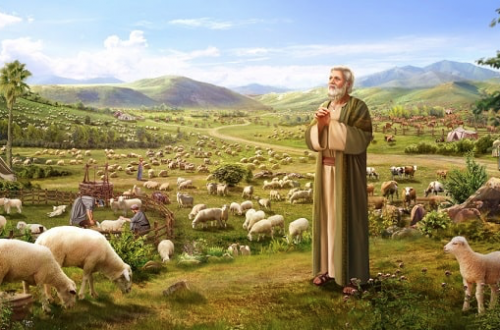Unlikely Restoration – Hosea 1:4-10
Jezreel – First Child of the Whore
Hos 1:4-5 And the Lord said to him, “Call his name Jezreel, for in just a little while I will punish the house of Jehu for the blood of Jezreel, and I will put an end to the kingdom of the house of Israel. And on that day I will break the bow of Israel in the Valley of Jezreel.”
Jezreel – First Child of the Whore
Hos 1:4-5 And the Lord said to him, “Call his name Jezreel, for in just a little while I will punish the house of Jehu for the blood of Jezreel, and I will put an end to the kingdom of the house of Israel. And on that day I will break the bow of Israel in the Valley of Jezreel.”
The name Jezreel means “God sows.” It is the name of a valley between Galilee and Samaria and the name of a small town at the southern end of that valley near Samaria. The Hebrew term translated “to sow” literally means “to scatter seeds.” This literary device is a play on words or perhaps a holy pun prophetically referring to the exile and dispersion of Israel. Jeroboam, the only king of Israel mentioned in 1:1, was the last stable kingship in the line of the house of Jehu. Jeroboam’s son, Zechariah, was murdered (ca 747 BC) after ruling only six months. This violent coup was followed by several more like it until finally the kingdom collapsed under the Assyrian siege of 722 BC. The reference to the “blood of Jezreel” goes back to 2 Ki 9:14-37 where Jehu slew King Joram of Israel and his mother, Jezebel, along with King Ahaziah of Judah (ca 842 BC). These events were prophesied by Elijah because Ahab and Jezebel arranged the murder of vineyard owner named Naboth (1 Ki 21) roughly a decade earlier. The full importance of Jezreel’s name, his relationship to the unfaithful mother, and God sowing will become clearer as we see it all in context. As for this specific prophecy, Israel’s military suffered a major defeat in Jezreel prior to the fall of Samaria.
No Mercy – Second Child of the Whore
Hos 1:6-7 She conceived again and bore a daughter. And the Lord said to him, “Call her name No Mercy [Hebrew: Lo-ruhama], for I will no more have mercy on the house of Israel, to forgive them at all. But I will have mercy on the house of Judah, and I will save them by the Lord their God. I will not save them by bow or by sword or by war or by horses or by horsemen.”
Israel’s sin is great and God’s anger is likewise great. The sins of Israel are unforgivable. Just as they pursued the false gods of their neighbors, forsaking God, they would be forsaken and shown no mercy by God. Assyria, the vessel of God’s wrath, was indeed merciless in its conquest of Israel. This passage goes to indicate that Judah would be spared, though not by its own military power. This came to pass in 701 BC when Assyria came up to the very gates of Jerusalem before being miraculously turned back.
Not My People – Third Child of the Whore
Hos 1:8-9 When she had weaned No Mercy, she conceived and bore a son. And the Lord said, “Call his name Not My People [Hebrew: Lo-ammi], for you are not my people, and I am not your God.”
This third child represents the third, final, and most damning of all the consequences of unfaithfulness. God punishes (first child) without mercy (the second child) and casts out (third child) sin.
Restoration Promised
Hos 1:10-11 Yet the number of the children of Israel shall be like the sand of the sea, which cannot be measured or numbered. And in the place where it was said to them, “You are not my people,” it shall be said to them, “Children of the living God.” And the children of Judah and the children of Israel shall be gathered together, and they shall appoint for themselves one head. And they shall go up from the land, for great shall be the day of Jezreel.
God declares that in spite of all their sin, the children of Israel would be beyond number. This recollection of God’s covenant to Abraham, Isaac, and Jacob seems at first glance to present a problem. The promise to gather the children of Israel and the children of Judah together under one ruler was fulfilled during the reign of Hezekiah (ca 716-687 BC). He brought representatives from among the survivors of the Northern tribes into his government in Jerusalem uniting, at least for a time, Israel and Judah (2 Ki 18-20, 2 Chr 29-32). Hezekiah restored YHWH worship in Jerusalem. Hezekiah was king when Assyria unsuccessfully laid siege to Jerusalem in 701 BC. The Assyrians were repelled, not by Hezekiah’s military, but by the hand of God.
If one looks at this passage from a Messianic perspective, the greater fulfillment of a uniting leader and the radical shift from forsaken to forgiven is seen in Christ. To be a “child of God” is to be intimately connected to God. God is Spirit, therefore it stands to reason that being an heir of God includes a significant spiritual component. Jesus was raised in the region of Galilee, surrounded by Gentiles and Hebrews descended from Northern tribes. John 4 describes an encounter Jesus had in Samaria early in his ministry. Part of the lesson to his disciples was that Jesus was there to redeem all of God’s people, not just those in or from Judea. As the resurrected King of kings, Jesus rules from Heaven all the countless multitudes who are the true children of Abraham – the faithful – whether they are biological descendants or adopted by faith.
The “day of Jezreel” can be viewed as the day that God sows or as a day of blood. Although Hezekiah’s stand may be the original literal fulfillment, this passage may also refer to the crucifixion. That was a great and terrible day when the Lord spilled his blood. Paul sheds light on the sowing analogy in 1 Cor 15 when he compares the transition from mortality to immortality to the transition from a seed to a living plant. Jesus was the firstfruit of the dead, risen by God, mortal turned immortal, a blood sacrifice once and for all for human sin. Jesus showed us flesh will be raised, renewed and perfected. What was sown in bloody temporal death was raised to eternal incorruptible life.
Taken together in the Messianic and spiritual context, Hos 1:10-11 speaks of a gathering by Christ of a multitude of people, once cursed but now forgiven, and departure from the land as the result of what was accomplished at the cross.


